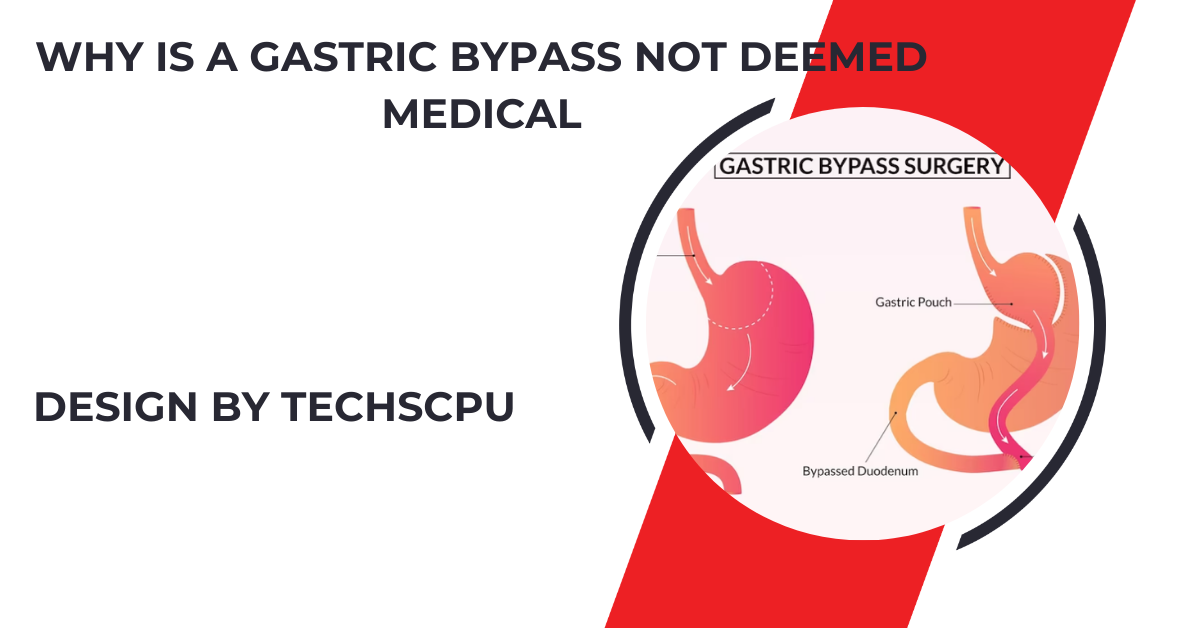Gastric bypass is not deemed a medical procedure because it addresses obesity through surgical means rather than directly treating a specific illness.
In this article, we will explore the reasons behind this classification, the criteria for gastric bypass eligibility, and its impact on overall health.
Understanding Gastric Bypass Surgery:

Gastric bypass surgery creates a small pouch from the stomach and reroutes the small intestine to connect to this pouch. This procedure limits the amount of food that can be consumed.
food one can consume but also alters how the body absorbs nutrients. While it is effective for weight loss, it is not categorised as a medical procedure in all contexts.
Key Points:
- Types of Gastric Bypass: The most common type is the Roux-en-Y gastric bypass, which significantly reduces stomach size and alters the digestive pathway.
- Purpose: Primarily aimed at helping individuals with obesity achieve significant weight loss and improve obesity-related conditions.
Purpose of Gastric Bypass:
Gastric bypass is primarily designed to help individuals with severe obesity lose weight. It is typically recommended for people who have not succeeded with other weight-loss methods, such as diet and exercise, and who are at risk for serious health issues due to their weight.
Why Is Gastric Bypass Not Always Considered Medical?
Nature of the Procedure:
The classification of gastric bypass often stems from its nature as a surgical intervention for obesity rather than a traditional medical treatment. Medical procedures typically address illnesses or diseases directly. In contrast, gastric bypass focuses on altering physiology to facilitate weight loss, making it less of a standard medical intervention.
Also Read: Methodist Dallas Medical Center – You Need to Know!
Eligibility and Criteria for Surgery:
Eligibility for gastric bypass surgery is generally limited to individuals who meet specific criteria, which further separates it from conventional medical treatments. Common requirements include:
- Body Mass Index (BMI): Most guidelines specify that candidates should have a BMI of 40 or higher, or a BMI of 35 or higher with obesity-related health conditions (such as type 2 diabetes or hypertension).
- Previous Weight Loss Attempts: Many insurance providers require documentation of unsuccessful weight loss attempts through non-surgical means, emphasising that gastric bypass is considered a last-resort option.
These stringent eligibility criteria reflect the notion that gastric bypass is not a first-line treatment but rather a significant intervention for severe obesity.
Lifestyle Modifications Required:

Post-surgery, patients must make considerable lifestyle changes to ensure long-term success. These changes often include:
- Dietary Adjustments: Patients are typically required to follow a strict diet that includes smaller portions and healthier food choices to prevent complications and ensure proper nutrition.
- Regular Physical Activity: Engaging in regular exercise is crucial for maintaining weight loss and overall health.
- Nutritional Monitoring: Since the surgery alters nutrient absorption, patients often need to take supplements and undergo regular monitoring to prevent deficiencies.
The Health Impacts of Gastric Bypass:
Health Benefits Associated with Weight Loss:
Gastric bypass can lead to substantial weight loss, which can alleviate several obesity-related health issues, including:
- Type 2 diabetes
- Elevated Blood Pressure
- Sleep apnea
- Joint pain
While these improvements are significant, the procedure is not a cure for these conditions but rather a means to manage them more effectively.
Also Read: How To Become A Medical Aesthetician – Medical Aesthetician Career Guide!
Nutritional Shortages:
Due to changes in digestion and nutrient absorption, patients may face nutritional deficiencies post-surgery. This aspect requires ongoing medical supervision and supplementation, emphasising the need for a comprehensive approach to post-operative care.
- Vitamin B12
- Iron
- Calcium
- Vitamin D
To combat these risks, ongoing medical supervision and supplementation are often required, reinforcing the notion that gastric bypass necessitates a comprehensive healthcare approach.
Psychological Considerations:

Psychological health plays a crucial role in the success of gastric bypass surgery. Patients are encouraged to participate in counselling or support groups to address emotional eating habits and develop healthier coping strategies. This psychological component further reinforces the notion that gastric bypass is not merely a medical procedure.
Counselling: Individual or group therapy sessions to address emotional issues related to weight and eating habits.
Support Groups: Connecting with others who have undergone similar experiences can provide motivation and encouragement.
Lifestyle Adjustments:
- Dietary Adjustments: Patients must adhere to a strict diet focusing on smaller portions and nutrient-dense foods to ensure adequate nutrition and prevent complications like dumping syndrome.
- Physical Activity: Regular exercise is encouraged to help maintain weight loss, improve mood, and enhance overall health.
- Regular Follow-Ups: Ongoing medical supervision is crucial to monitor for nutritional deficiencies, adjust dietary plans, and support psychological well-being.
Also Read: La Care Medical How See Derm – LA Care Dermatology Guide!
Complications and Risks:
- Surgical Risks: Like any major surgery, gastric bypass carries risks such as infection, blood clots, and complications from anaesthesia.
- Dumping Syndrome: This condition can occur when food moves too quickly from the stomach to the small intestine, leading to nausea, vomiting, and diarrhoea after eating high-sugar or high-fat meals.
FAQ’s
1.What is gastric bypass surgery?
Gastric bypass surgery involves creating a small stomach pouch and rerouting the small intestine to facilitate weight loss by restricting food intake and altering nutrient absorption.
2.Who is eligible for gastric bypass surgery?
Candidates typically have a Body Mass Index (BMI) of 40 or higher, or 35 with obesity-related health issues, and must document unsuccessful attempts at weight loss through non-surgical means.
3.Why is gastric bypass considered a last resort?
It is considered a last resort because it requires significant lifestyle changes and is aimed at individuals who have not had success with other weight-loss methods.
4.What are the health impacts of gastric bypass?
The surgery can lead to substantial weight loss and improvements in obesity-related health issues, but it also carries risks of nutritional deficiencies requiring ongoing supervision.
5.How important is psychological support after gastric bypass?
Psychological support is crucial, as counselling and support groups help patients manage emotional eating and develop healthier coping strategies for long-term success.
Conclusion
Gastric bypass surgery is a significant intervention for individuals struggling with obesity, but it is not deemed a standard medical treatment in all contexts. Its classification stems from the nature of the procedure, eligibility criteria, required lifestyle changes, and the holistic approach to patient care necessary for long-term success. Understanding these factors can help patients

Leave a Reply